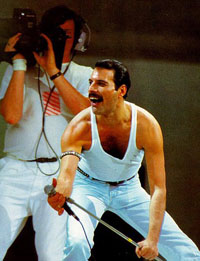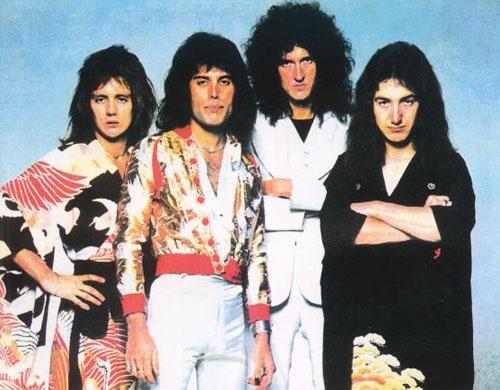Despite selling 300 million albums, being memorialised in stage musicals and computer games and with a feature film about their early career in the works, Queen are still moaning about the press. It's a theme that simmered steadily through this two-part history, with drummer Roger Taylor especially splenetic about the cruel and unusual treatment doled out to his band by first the music papers ("the evil empire"), then later the tabloids.
It's true that, in Britain, they did get regular kickings in print (though it's difficult to believe that any rational adult could get seriously upset about the NME's headline "Is this man a prat?"), and the coverage of Freddie Mercury's death from Aids verged on the rabid, but this whingeing tone made them look foolish and small-minded. Which was a shame, because there was plenty of interesting and historic material on display here, and the story of Queen and Mercury is one of the most noteworthy sagas in the history of British rock music.
 But maybe it's that "Queen + Mercury" equation which is the clue to a certain ambivalence some have felt about the group. Without Mercury, they would have been a bunch of musically skilled but charisma-free middle-class English boys, a kind of Pink Straits or Dire Genesis. Just add Mercury, and they became a kandy-coloured tangerine-flake showbiz monster, spewing lurid campness and mad explosions of baroque harmonies and rock operetta in all directions. As American journalist Harvey Kubernick put it, it wasn't rock'n'roll, it was Broadway. Yet while Mercury did his Nureyev-meets-Maria Callas routine out front, bassist John Deacon remained as anonymous as a cloakroom assistant, while Brian May's eternal fuzzball hair has defied four decades of ceaselessly changing rock fashion (Queen rock in Rio, pictured below).
But maybe it's that "Queen + Mercury" equation which is the clue to a certain ambivalence some have felt about the group. Without Mercury, they would have been a bunch of musically skilled but charisma-free middle-class English boys, a kind of Pink Straits or Dire Genesis. Just add Mercury, and they became a kandy-coloured tangerine-flake showbiz monster, spewing lurid campness and mad explosions of baroque harmonies and rock operetta in all directions. As American journalist Harvey Kubernick put it, it wasn't rock'n'roll, it was Broadway. Yet while Mercury did his Nureyev-meets-Maria Callas routine out front, bassist John Deacon remained as anonymous as a cloakroom assistant, while Brian May's eternal fuzzball hair has defied four decades of ceaselessly changing rock fashion (Queen rock in Rio, pictured below).
 But, implausible or not, the combination worked spectacularly well, and it was salutary to be reminded of the sheer quantity and variety of the band's work. After the early multi-harmonied spectaculars of "Killer Queen", "Bohemian Rhapsody" and "Somebody to Love" - there was some great footage of the quartet multitracking their wall of voices for the latter - came the mega-stompers "We Will Rock You" and "We Are the Champions". "Crazy Little Thing Called Love" and "Another One Bites the Dust" took them to the top of the American charts - and it might have been nice if the film had acknowledged the palpable debt "Dust" owed to Chic's "Good Times" - and then they alienated their American fanbase with the drag queens video for "I Want to Break Free".
But, implausible or not, the combination worked spectacularly well, and it was salutary to be reminded of the sheer quantity and variety of the band's work. After the early multi-harmonied spectaculars of "Killer Queen", "Bohemian Rhapsody" and "Somebody to Love" - there was some great footage of the quartet multitracking their wall of voices for the latter - came the mega-stompers "We Will Rock You" and "We Are the Champions". "Crazy Little Thing Called Love" and "Another One Bites the Dust" took them to the top of the American charts - and it might have been nice if the film had acknowledged the palpable debt "Dust" owed to Chic's "Good Times" - and then they alienated their American fanbase with the drag queens video for "I Want to Break Free".
 In 1985 they hauled themselves back from the disastrous misjudgment of playing South Africa's Sun City and Mercury's bid to go solo by playing a scintillating set at Live Aid, an event which converted many Queen-haters into fans and galvanised them to make possibly their best album, A Kind of Magic. And I still haven't mentioned "Radio Ga Ga", "Under Pressure" and "These Are the Days of Our Lives" (Freddie at Live Aid, pictured right).
In 1985 they hauled themselves back from the disastrous misjudgment of playing South Africa's Sun City and Mercury's bid to go solo by playing a scintillating set at Live Aid, an event which converted many Queen-haters into fans and galvanised them to make possibly their best album, A Kind of Magic. And I still haven't mentioned "Radio Ga Ga", "Under Pressure" and "These Are the Days of Our Lives" (Freddie at Live Aid, pictured right).
It's an awesome CV by any measure, but the only one you really wanted to watch was Mercury. It was as if he realised that Queen was his one great shot at superstardom, and he was going to swallow it whole while the going was good. Paul Gambaccini added a telling anecdote about how he'd met Mercury in a gay club in 1983 and asked him whether he was moderating his lifestyle in the light of the then-unnamed menace of Aids. "Darling, my attitude is 'fuck it'," said Fred. "I'm doing everything with everybody." That was his story, and he stuck to it.
- Watch Queen - Days of Our Lives on BBC iPlayer
 Find Queen on Amazon
Find Queen on Amazon
Watch Queen's video for Radio Ga Ga















Add comment